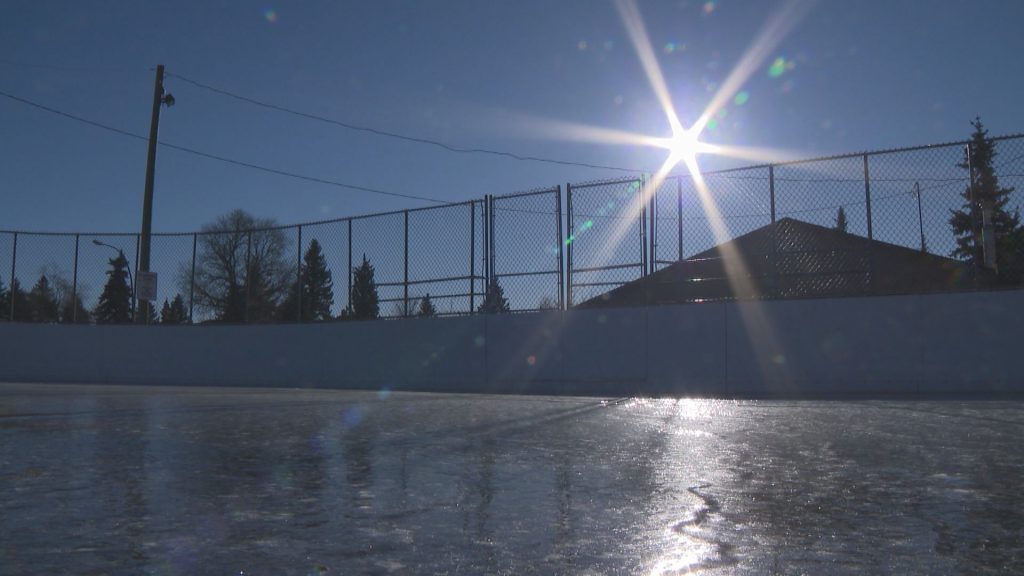In an unexpected development, Environment and Climate Change Canada shared a report about the amount of hot weather records broken in Alberta as winter shifts to spring.
In a post on its website Tuesday, the weather agency stated initial data suggests that 24 weather stations in the province either matched or set new records for the highest temperatures ever recorded on March 18 since such records have been monitored.
ECCC pointed out that the data for Monday's temperatures might include unofficial information and that the report does not “constitute a complete or final report.”
Global Edmonton weather specialist Phil Darlington mentioned that Alberta was “enjoying a pleasant ridge from the west late last week which prepared the entire province for those well-above-normal daytime highs and overnight lows.”
“Breaking daily high and low records isn't unusual when we experience a setup like the one we had, but it's worth noting that some of the broken records are approximately 100 years old, while others were set just a few years ago,” he said.
The warm weather on Monday was followed by a sudden drop in temperatures in much of the province, with some areas in Alberta being warned to anticipate up to 25 cm of snowfall this week.
“We saw the heat from that ridge quickly defeated as a cold front slid south over Monday and Tuesday; that cold shoe is not coming off the other foot anytime soon,” Darlington said.
Here is a list of the March 18 records that were either matched or set on Monday.
Athabasca area
Matched the record of 16.1 C set in 1910
Banff area
Set a new record of 15.8 C
Previous record of 13.9 C was set in 1928
Barrhead area
Set a new record of 16.4 C
Previous record of 15.0 C was set in 1928
Beaverlodge area
Set a new record of 15.1 C
Previous record of 13.3 C was set in 1928
Bow Valley Provincial Park area
Set a new record of 17.9 C
Previous record of 16.7 C was set in 1960
Breton area
Set a new record of 17.0 C
Previous record of 14.1 C was set in 2019
Brooks area
Set a new record of 19.0 C
Previous record of 18.5 C was set in 2021
Cardston area
Set a new record of 19.8 C
Previous record of 16.7 C was set in 1946
Clareshom area
Set a new record of 19.3 C
Previous record of 17.9 C was set in 2021
Cold Lake area
Set a new record of 14.3 C
Previous record of 14.0 C was set in 2021
Crowsnest area
Set a new record of 16.3 C
Previous record of 13.9 C was set in 1972
Edmonton International Airport area
Set a new record of 16.0 C
Previous record of 14.1 C was set in 2021
Elk Island National Park area
Set a new record of 14.0 C
Previous record of 13.5 C was set in 2021
Grande Prairie area
Set a new record of 15.4 C
Previous record of 12.5 C was set in 1990
Highvale area
Set a new record of 16.2 C
Previous record of 15.2 C was set in 2021
Jasper area
Set a new record of 18.1 C
Previous record of 16.7 C was set in 1947
Lethbridge area
Set a new record of 19.7 C
Previous record of 18.5 C was set in 2021
Lloydminster area
Set a new record of 13.2 C
Previous record of 11.8 C was set in 2021
Lac La Biche area
Set a new record of 14.4 C
Previous record of 11.8 C was set in 2001
Milk River area
Set a new record of 19.8 C
Previous record of 18.2 C was set in 2017
Nordegg region
Established a new highest temperature of 18.8 degrees Celsius
The previous highest temperature of 16.6 degrees Celsius was established in 2019
Pincher Creek region
Established a new highest temperature of 19.4 degrees Celsius
The previous highest temperature of 16.7 degrees Celsius was established in 1946
Vegreville region
Established a new highest temperature of 15.3 degrees Celsius
The previous highest temperature of 14.8 degrees Celsius was established in 2021
Waterton Lakes National Park region
Established a new highest temperature of 17.6 degrees Celsius
The previous highest temperature of 14.6 degrees Celsius was established in 2021



